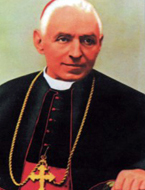|
 John
Baptist Scalabrini John
Baptist Scalabrini
John Baptist Scalabrini, Bishop of Piacencia and founder
Congregations of the Missionaries of
Saint Charles and the Missionary Sisters of Saint Charles Borromeo –
Scalabrinians, was born on 8 of July of 1839 in the city of Como, Italy. When he
was 18 years old he entered the seminary.
He was ordained a priest in
1863 and consecrated as bishop in 1876.
During his life, Scalabrini
developed many pastoral activities. However, his preoccupation with the migrants
was the one the differentiated him from the other bishops of his time.
Scalabrini’s sensibility with
the drama lived by the migrant families could not be separated from his
preoccuaption with the poor who lived within Italy itself. His pastoral
predilection for the prisioners, sick and deaf-dumb is a known fact.
The taks of the Chruch, for
Scalabrini, was to intervine together with the State and political groups
whenever the interessess of the poor were at stake. In his Pastoral Letter of
1882 to the Piacenza Diocese he said, “It is necessary to participate in the
public life, taking advantage of all the licit means, for the triumph of truth
and justice.”
This availability and openness
to new social questons put him closer to the drama of the migrants and also to
put himself into action to serve the people. In his Pastoral Letter of 1891 he
made and afirmation that even today throws us into the mission, “We must leave
the temple if we want to exercise a healthy action within the temple.”
In 1880, at the Milan Railroad
Station, his sensibility for the migrants was quickened by the dramatic
conditions of the poor migrants who waited for the train to Genoa, from where in
ships, they would embark to the Americas. This is how the Bishop of Piacenza
described it, “In tears they had said goodbye to their native village, to which
they were linked by many happy memories, but without being homesick they were
ready to abandon their country. They did not know it other than in a hated form:
a place of enlistment and of high taxes. For the disinherited, the country that
gives them bread is his country: there, far, far away they hoped to find bread,
less scarce, less sweated.”
In the search for adequate
answers to the suffering of the migrants, Blessed Scalabrini made inumerous
interventions: he published, elaborated proposals for a law on Italian
emigration, he founded the Congregation of the Missionaries of Saint Charles
(1887), he created the Saint Raphael Society, a lay movement in service to the
migrants, he founded the Congregation of the Missionary Sisters of Saint Charles
Borromeo (1895), gave diocesan recognition to the Apostels of the Sacred Heart
and sent them to work with the Italian emigrants in Brazil (1900)
To know the situation in which
the Italian emigrants lived, Scalabrini, when he was 62 years old and sick,
travelled to the United Stathes, Brazil and Argentina, between 1901 to 1904. On
these tripshe made it a point to go to each place where there were Italian
emigrants, no matter the existing difficulties. His persistence strengthened and
consolidated hte initiated works by the missionary priests and sisters of Saint
Charles.
In a letter of Scalabrini
directed to Pope Leo XIII in 1901, we find an evaluation of the works already
realized. In this tet, Bisihop Scalabrini spoke of his motivations and hopes,
“If I look at the works realized among not too few difficulities, Ihave great
motives to be happy in the Lord. But, if, with thoughts I penetrate in the
profound recesses of my spirit, I see nothing if not material for remorse for
that which was not done or was not done well. Of one thing however, I can assure
you, Holy Father: in every cirumstance I never had in mind anything else except
the glory of God and the salvation of the souls confided to me.”
His prophetism, his charity,
his love for the migrants and his teachings give us an example of a holy bishop,
a model for our days. Scalabrini died on June 1, 1905. On November 1, 1997 he
was beatified with the title of Father of the Migrants by Pope John Paul II.
To learn
more:
Scalabrini Missionaries - Biography
|